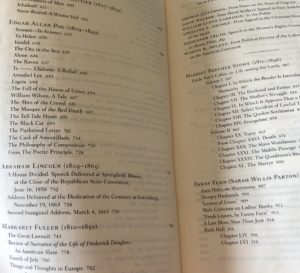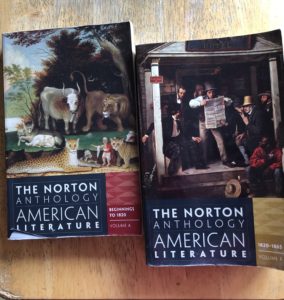Welcome to the cKotch.Com blog. I’m Christopher Kotcher, and this is an awesome college English class. It is a post written in honor of the late Professor L.

Four Core Courses
My English major at University of Michigan-Dearborn centered around four major literature classes. The best of these for me was English 313 American Literature: Colonialism to 1900.
Like any course, the professor made all the difference.
He was one of the few who still wore brown shirts and tweed jackets instead of button-down shirts or full-on suits.
He cared far more for grammar than my other professors. None of ever caught grammar errors from me.
Good old L was unlike anyone else, except maybe R to an extent. So, L’s class taught me a few things that few college classes dared to teach me. Lessons that have applied to every part of my life.
Structure of the Class
This was one of those classes with easy day-to-day meetings yet challenging assignments. There were only a few more grades than my Honors Program courses.
L had us do three oral reports in addition to our two larger research essays.
The oral reports were the lifeblood of the course. Every topic was meant to be taught through an oral report. We would pick topics off the syllabus the week prior to any class session.
As long as you did three oral reports total, you could receive full credit for that part of your grade. If you were not satisfied with your grade, you do an extra report to try balancing things out.
After each report, L took time to discuss the topic. This was his chance to connect literary ideas and fill any gaps which may have marked someone’s report.
Oral reports could feature various topics. There was something for everybody. Literary analysis, author biographies, historical context, personal responses.
Research essays offered similar levels of freedom. Though due dates were not quite as flexible.
Essays could be either historical or literary analysis. Sources could be a combination of historians and literary critics.
You did not even need traditional introduction or conclusion paragraphs. Your essay’s structure just needed to support the development of your ideas.
Only real requirement was to focus the essay on something already covered in class.
I enjoyed this combination of freedom and responsibility.
Class was what we made of it, and we chose what parts we made. This was what I expected and wanted college to be.
Not everyone appreciated this chance. Not everyone could even handle it. I remember one classmate trying to submit an essay on William Shakespeare to this American Literature class.
Still, I did gain much from the course’s unique opportunities. Much more than I had ever bargained for.
My Time in Class
My approach to L’s course was strategic to start.
I compared L’s syllabus to other courses’ syllabi. My oral report selections tended to be about their dates as much as the topics themselves.
I would not make myself work on an oral report at the same time I was writing an essay or studying for an exam in another class. I also aimed to have all three required reports done by October’s end.
It is a blessing I could still cover the lives of Washington Irving and Edgar Allan Poe despite my tactical thinking. My first oral report, on Native American trickster stories, was pretty enjoyable too.
If my grades were low, I would have plenty of time to recover. If my grades were good, I would have one less batch of coursework near semester’s end.
The second essay was due the week of Thanksgiving. L gave no exams, and there was no extra final essay. Just three oral reports, two essays, and class participation.
All I would need to do for the last few weeks would be reading and adding one or two points in classroom discussions.
I did far more than planned.
This was the first class where I started running the discussions. Many of my peers believed they could get away with reading only for their oral reports.
That led to some silent meetings.
So, I stepped up. L seemed cool, and I did not want his class to be awkward. If I read and if I had ideas, then I should share them. Almost no one else was doing it.
L always found something intriguing in my comments. Without him, I cannot imagine myself running discussions in my later college courses.
My biggest breakthrough came one day when no one would volunteer for oral reports on Walt Whitman day.
An important day no doubt. Whitman was a key figure of transcendentalism. The major American literary movement favoring the spirituality of nature over scientific knowledge of it.
This was November though. Many had already done three reports. Some had other assignments due that week. A few may not have cared anymore.
I was in the first group.
This was November. I was done with major work for this course aside from the second essay.
But being one of the course’s unofficial discussion leaders often invites unexpected responsibilities.
L volunteered me for the biggest oral report on Walt Whitman day. The one no one of right mind would want to do.
An analysis of several parts of Whitman’s central poem “Song of Myself.” This was an oral report far more involved than any of the others I had already done.
Reporting the Song
I went to lunch in the University Center that day annoyed.
I already had an A in L’s class. This fourth oral report could not help me. In fact, it seemed it could only lower my grade.
Not to mention, I had tons of projects approaching in all my courses that semester.
L’s second essay was approaching. My English 311 course, British Literature: Beowulf to Milton, would have its term paper soon. I needed to start researching for my final project in Introduction to Linguistics. For my second Honors Program history course, I had already been writing three short essays on feudalism, scholasticism, and Thomas Aquinas.
I did the thing most nervous college students do. I started calculating how bad I could do and still maintain my grades. I started with L’s class. He was the one who made me panic in the first place.
Then L walked up to me table. He had just grabbed his lunch.
I chuckled and blocked my grade calculations. Still, I expected him to have seen them. I was waiting for some joke about me looking for the easy way out.
Instead, L had nothing but good things to say to me.
He talked about the quality of my class discussions. Praised the strength of my writing.
About the “Song of Myself” report, he even looked at me and said, “I’m counting on you.”
That stung me.
When L left, I looked at my grade calculations. In that moment, I was not being the student my professor had praised me for being.
I was letting my grades, numbers and letters, overtake my willingness to learn, my effort in class, my desire to challenge myself.
I went to college for more than mere numbers and letters.
I erased my grade calculations and replaced them with the phrase, “Just do the work.” The rest of lunch became my time to work through “Song of Myself.” My moment to start writing the script for my oral report.
My report on Whitman’s contemplation on spirituality, eternal happiness, and grass impressed the whole class. This was my best oral report. L even gave it an A+.
Lessons Learned
By the end of English 313, I had done four oral reports and two essays.
My oral reports covered Native American trickster stories, Washington Irving’s life, Edgar Allan Poe’s life, and Walt Whitman’s “Song of Myself.”
My essays explored Irving’s celebration of bachelorhood in “Rip Van Winkle” and Poe’s discussion of insanity in “The Tell-Tale Heart.”
I read many great works, and I improve my discussion skills.
Professor L had captivated all our attention in some way. With final essays submitted and no exam looming, we all still went to the last few classes. I cannot remember anyone being absent for his final lesson, on Civil War writer Stephen Crane.
You know you have a good professor when he needs no assignment or exam to keep you listening.
I wish I could have learned more lessons from L.
A few semesters later, I signed up for his Anglo-Irish literature course. Class met once, and he handed out our out-of-print textbooks. He seemed happy to have me in a class again.
He would pass class could meet again.
I did not believe it. If I did not have my rosary in my backpack, I do not know how I would have handled the day I found out.
I will never forget all this man taught me and everything I believe he saw in me. May that person always be reflected in who I am. In learning, in teaching, in writing, in everything.

Kotcher’s Call to Action
If you like my content and wish to see more, then you have a few options.
You could check out my book Five Strange Stories on Amazon. Five Strange Stories is enrolled in the Kindle Matchbook program, so anyone who buys the paperback can also get the eBook for free.
You can also check my Essential Posts page for links to some of my greatest posts to the cKotch.Com blog.
Finally, be sure to like my Facebook page and share it with your friends. I post a link there whenever a new blog post goes live each Friday at 5:00 PM EST.